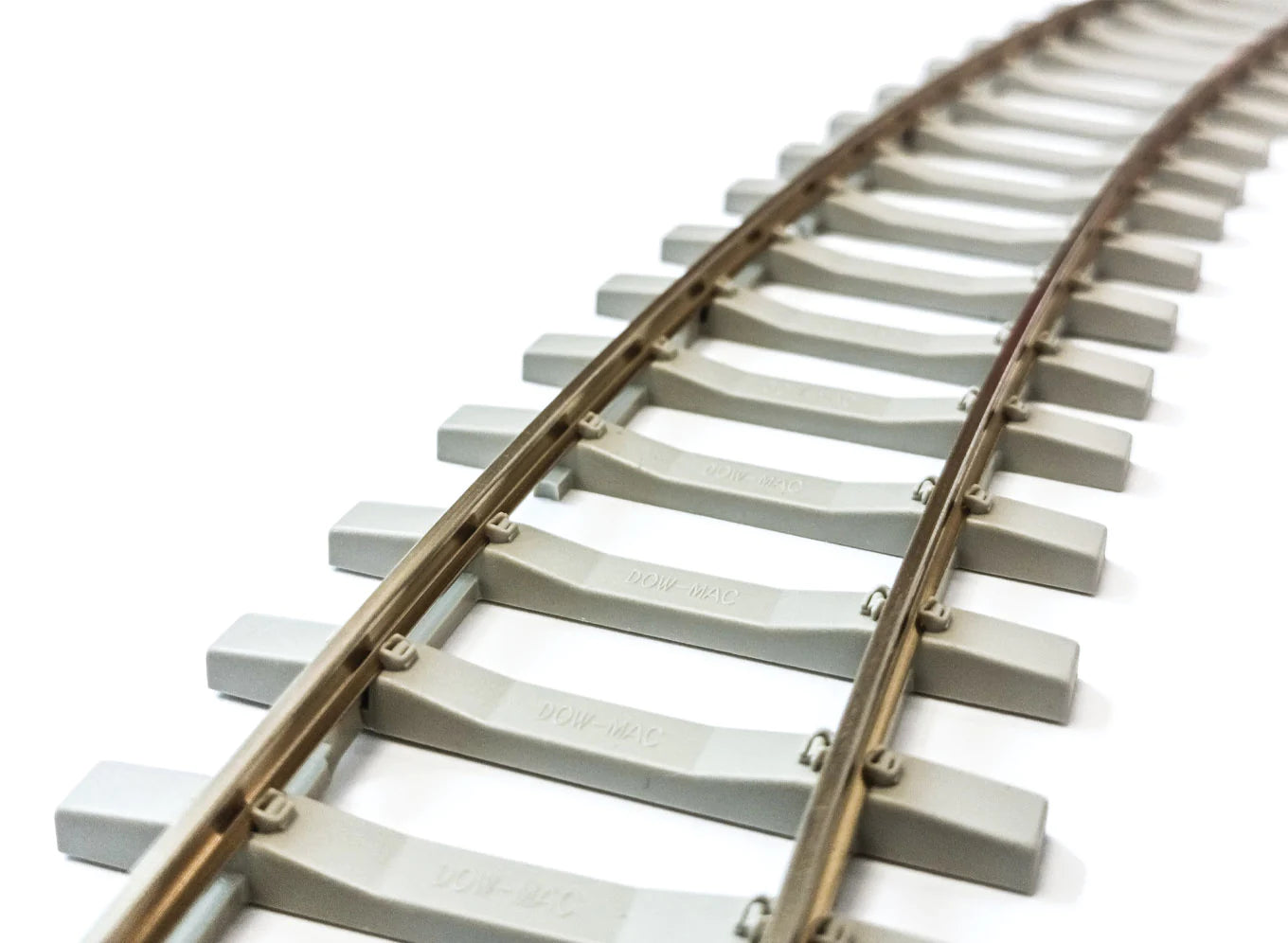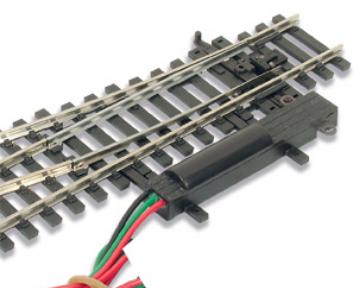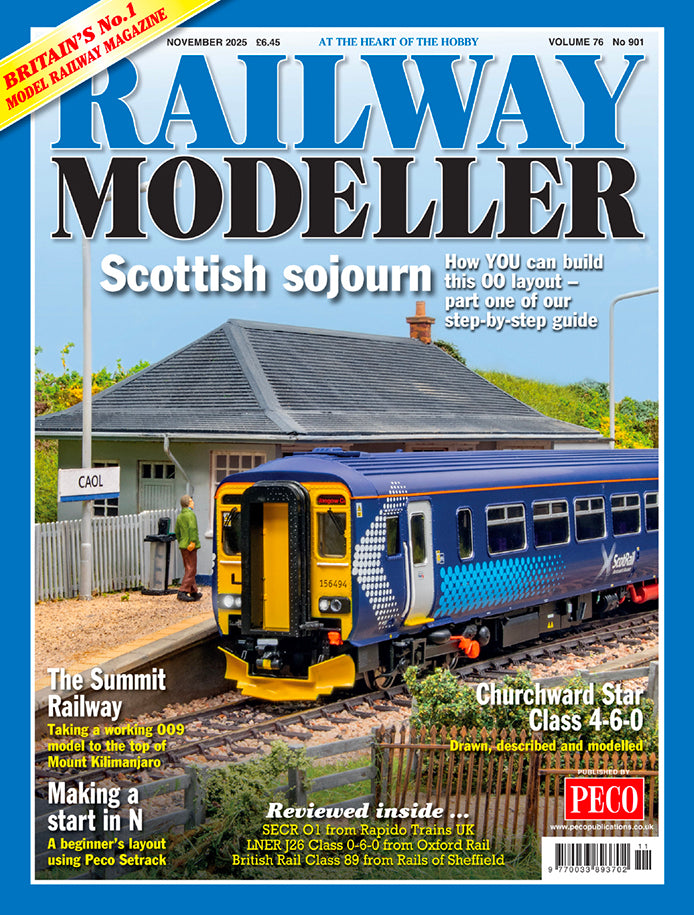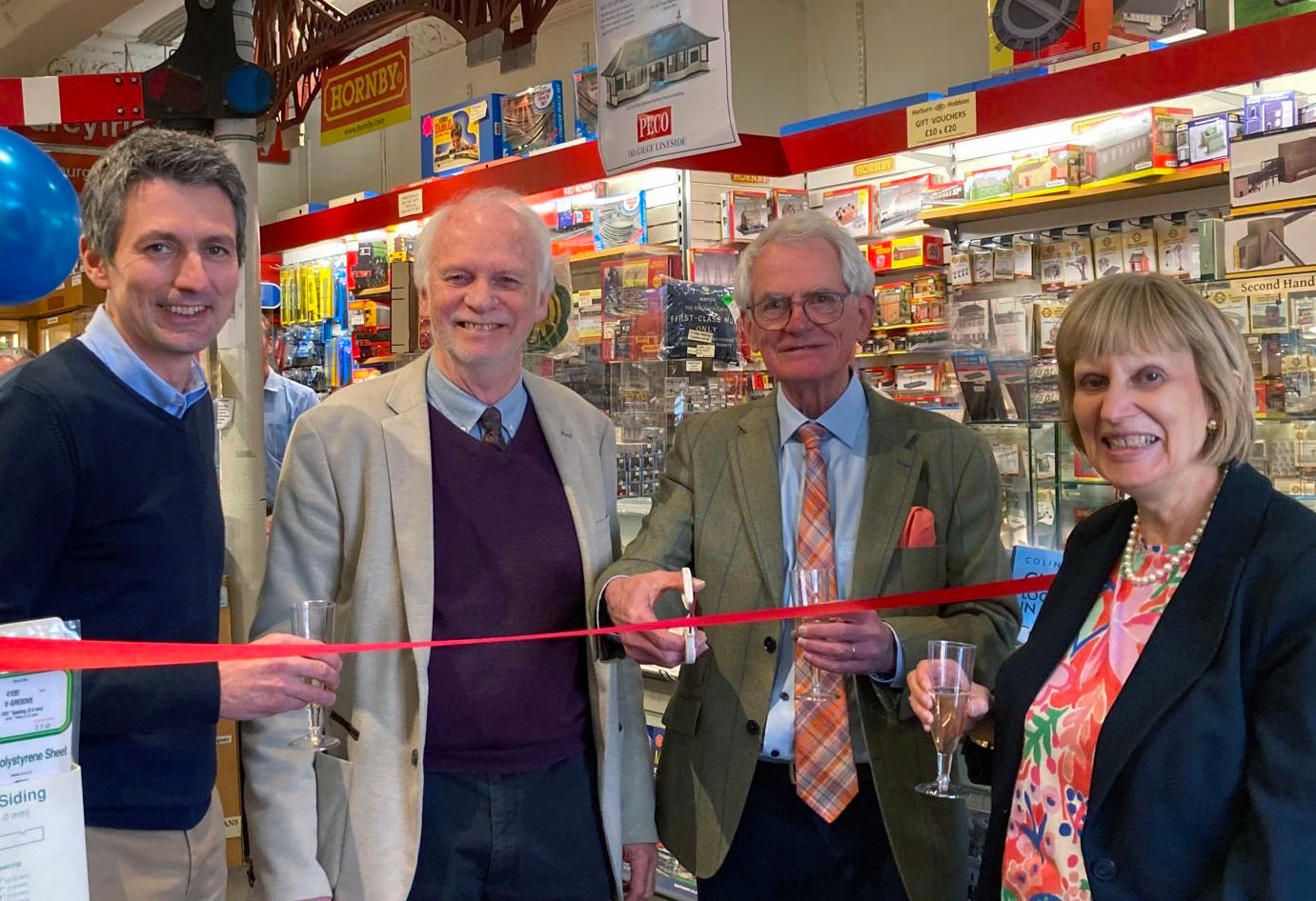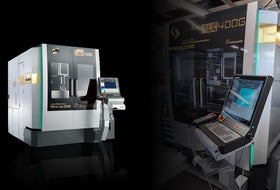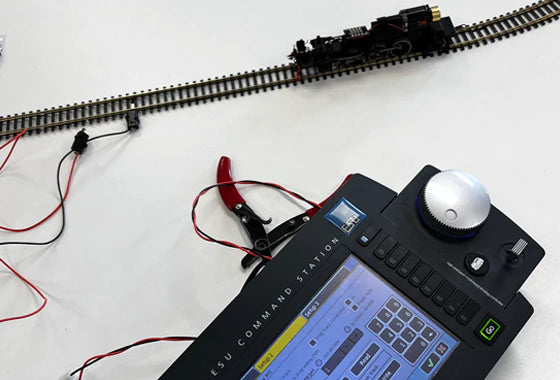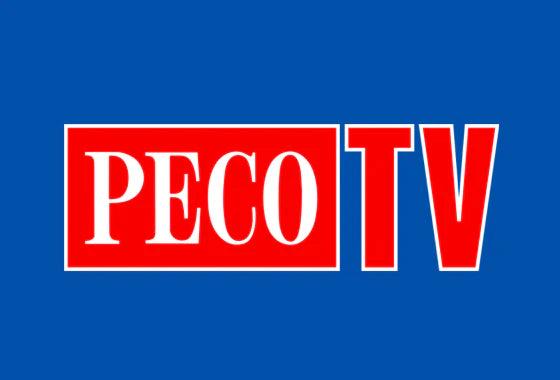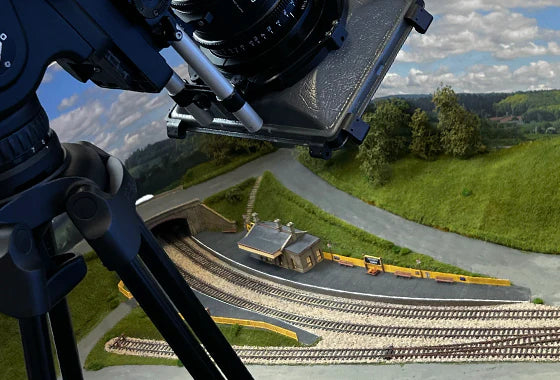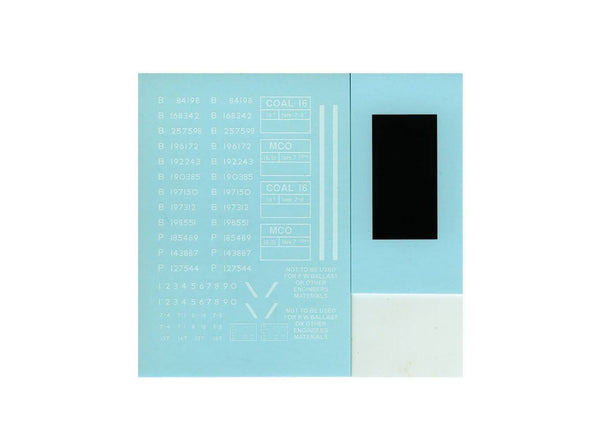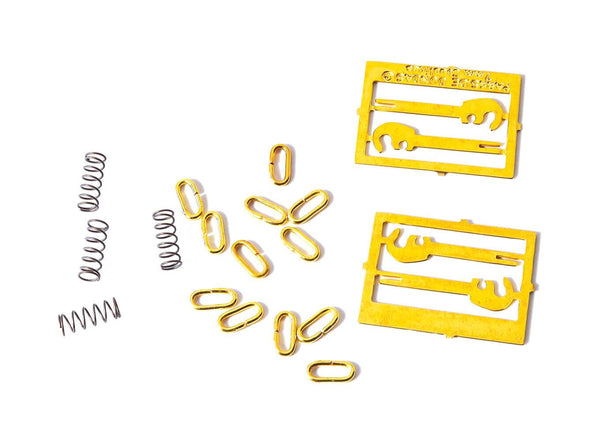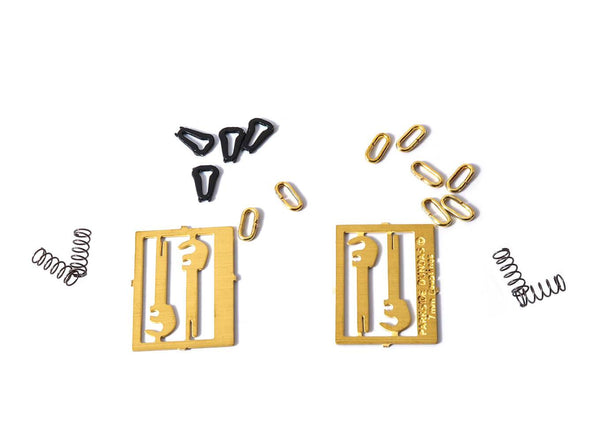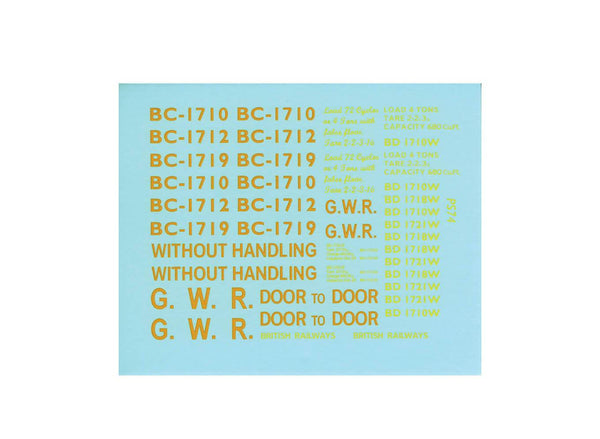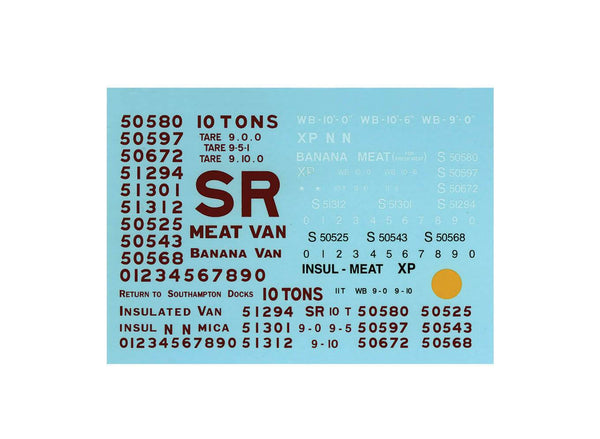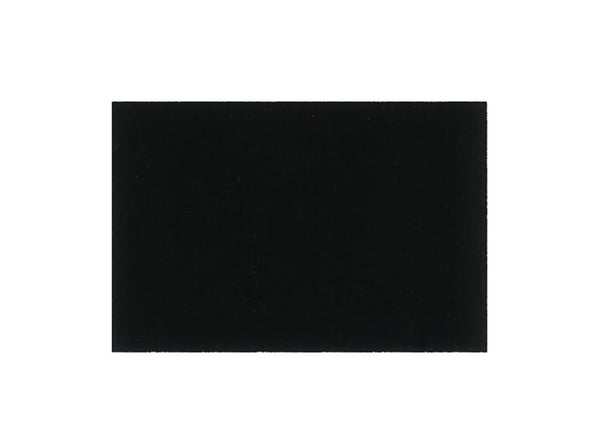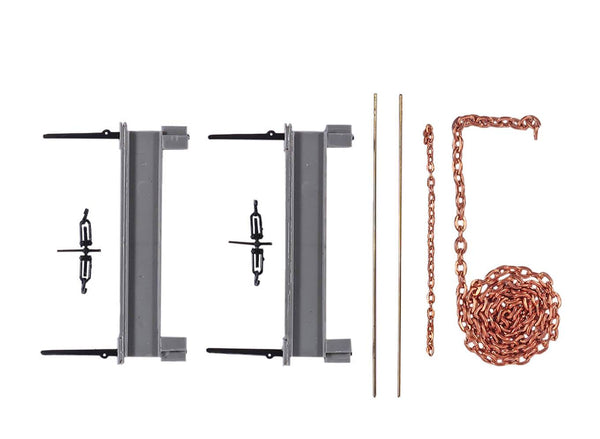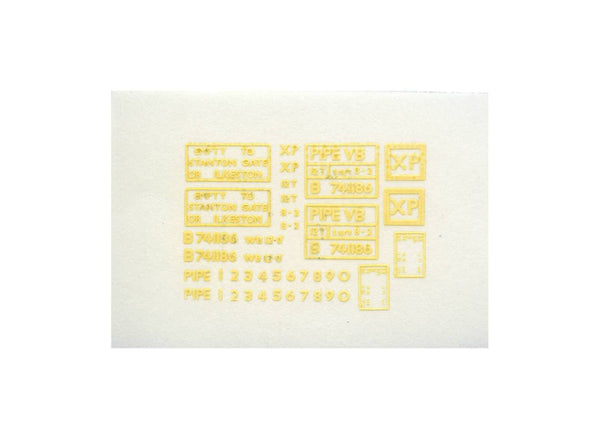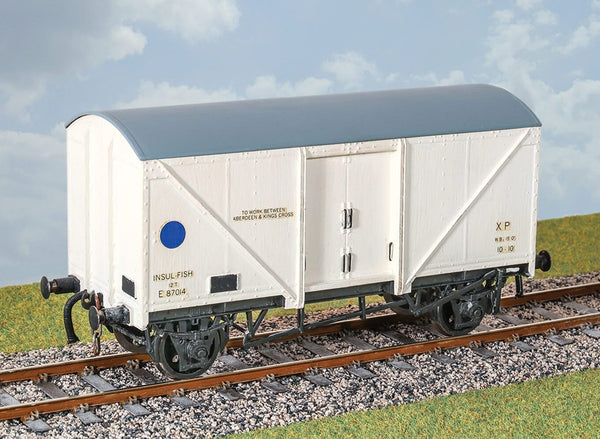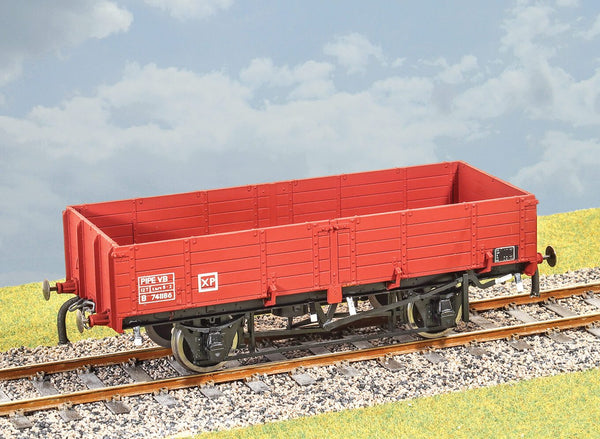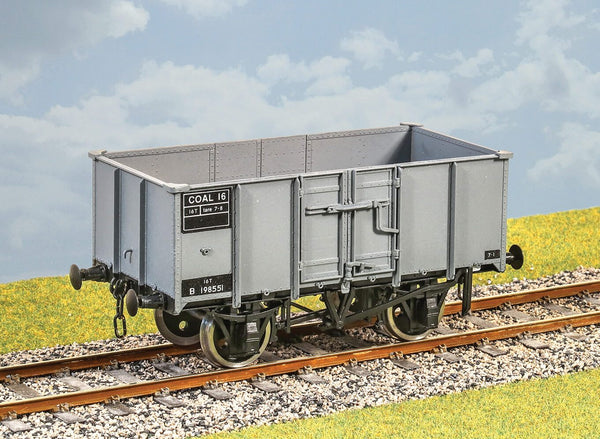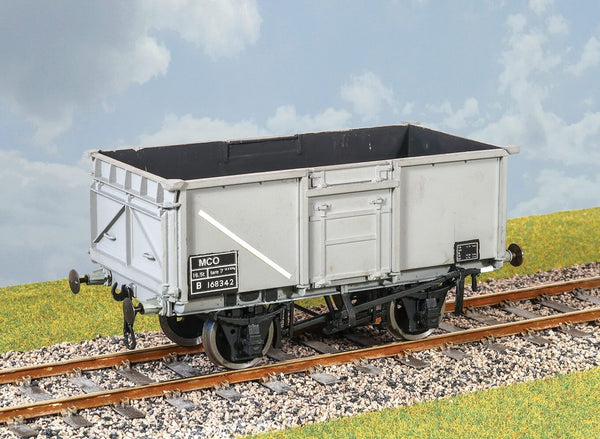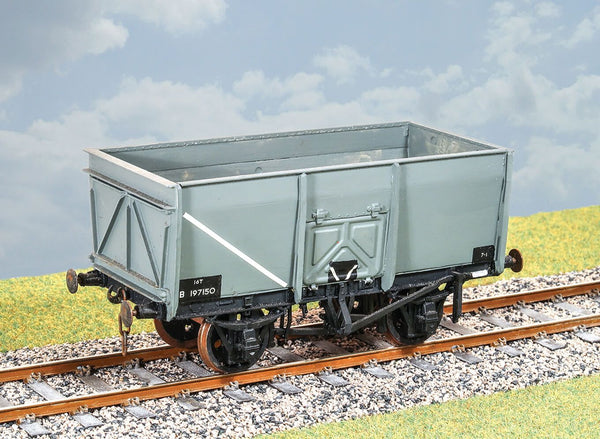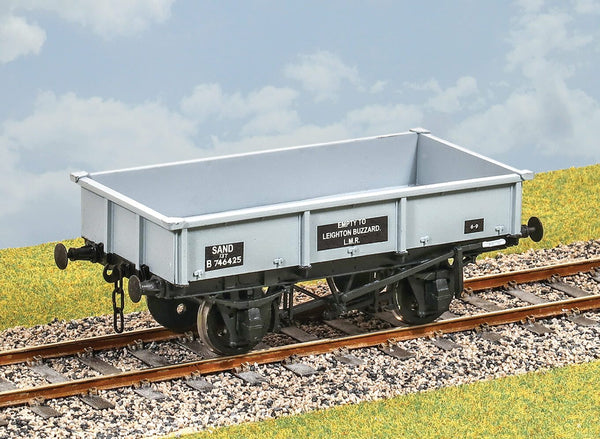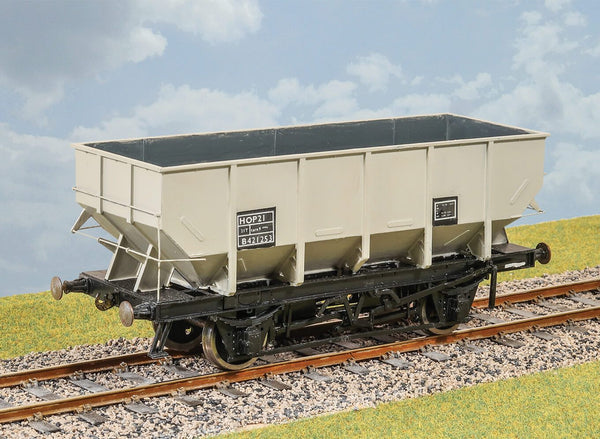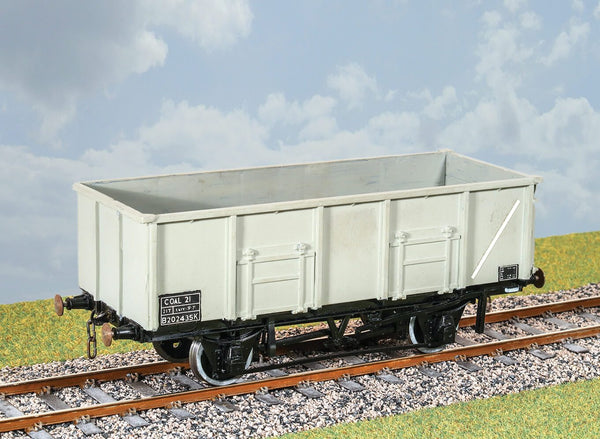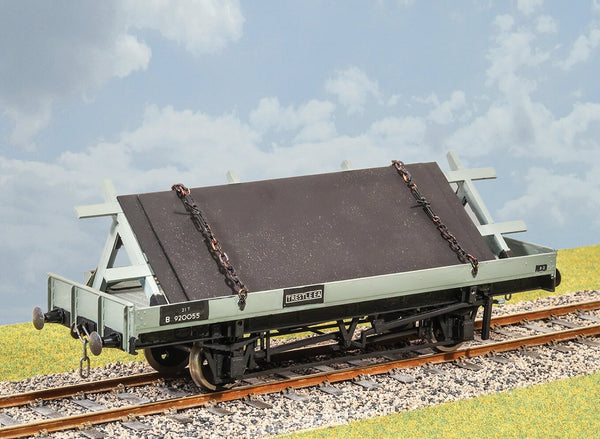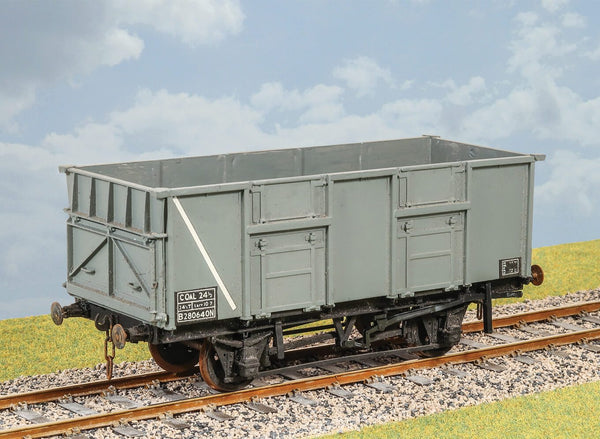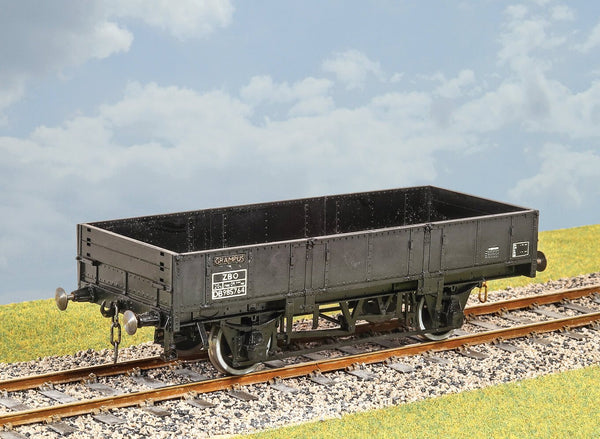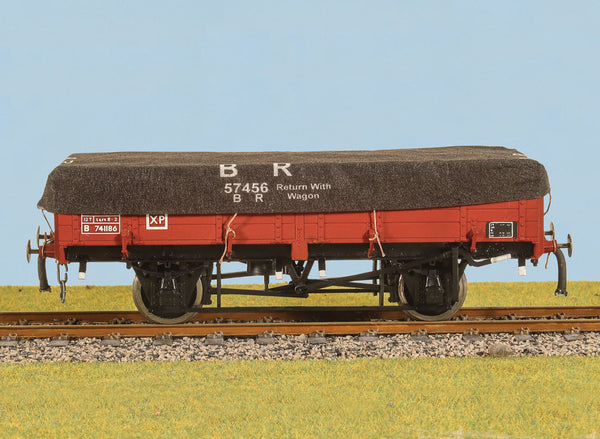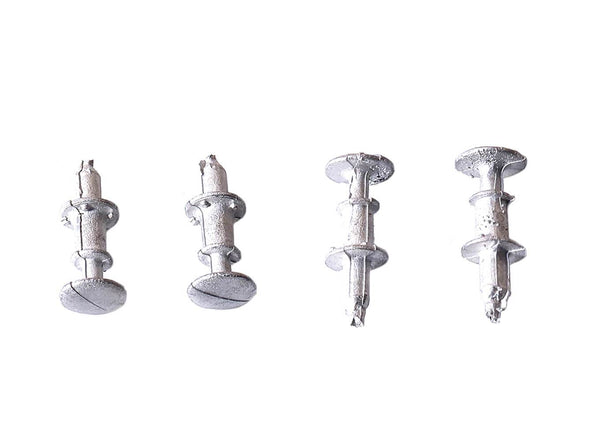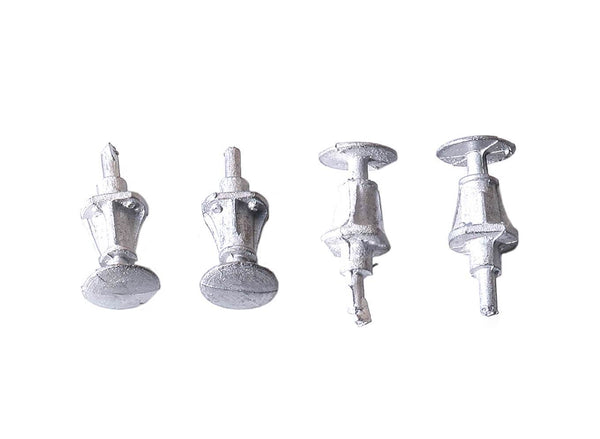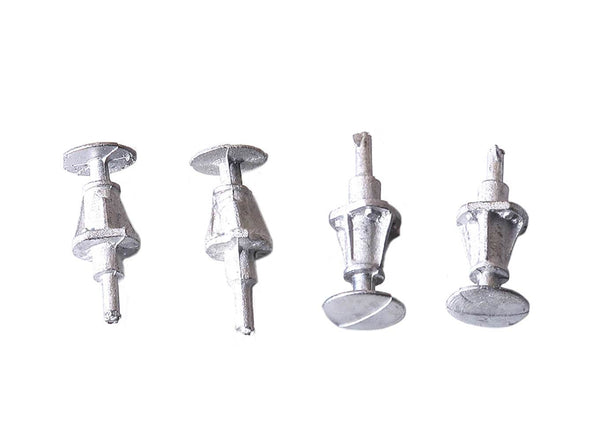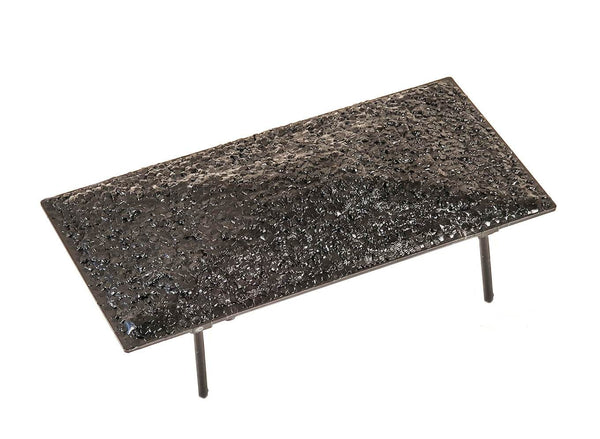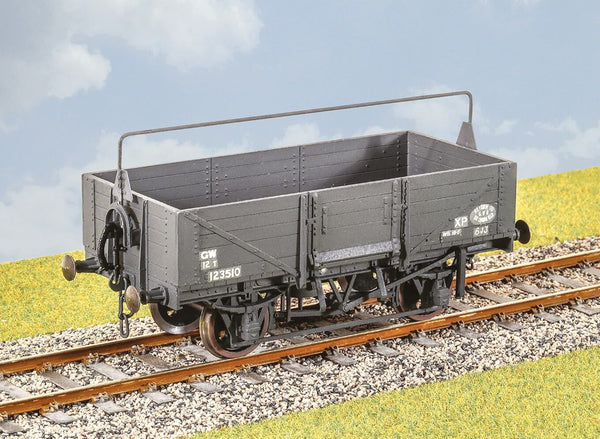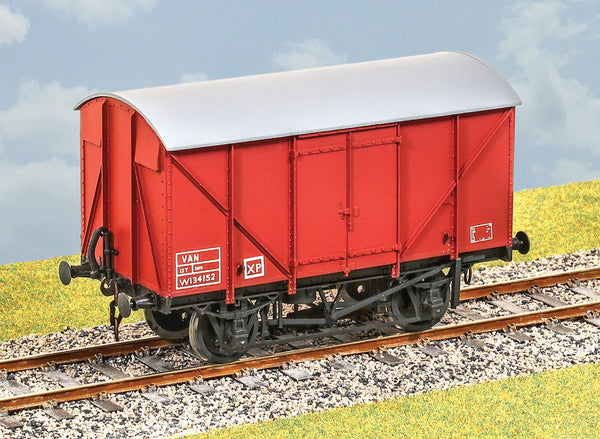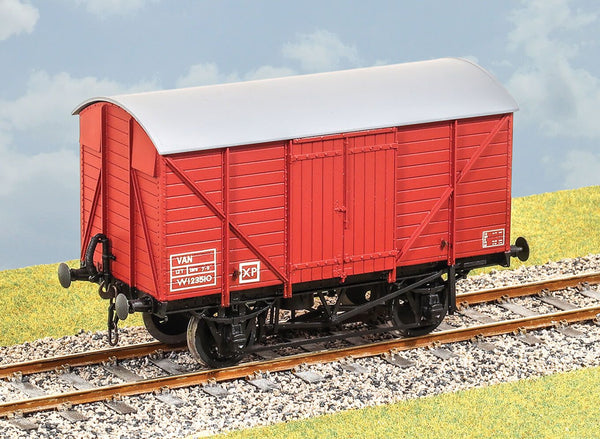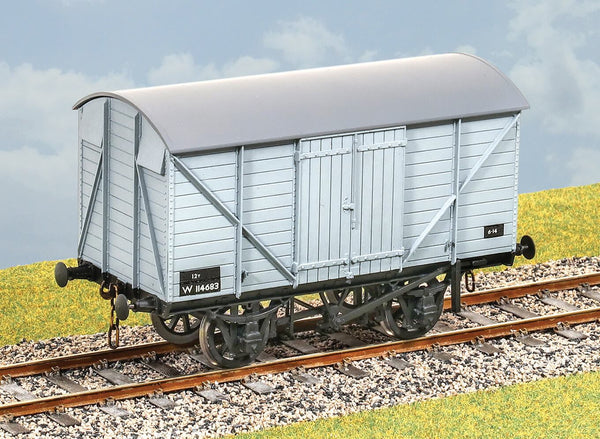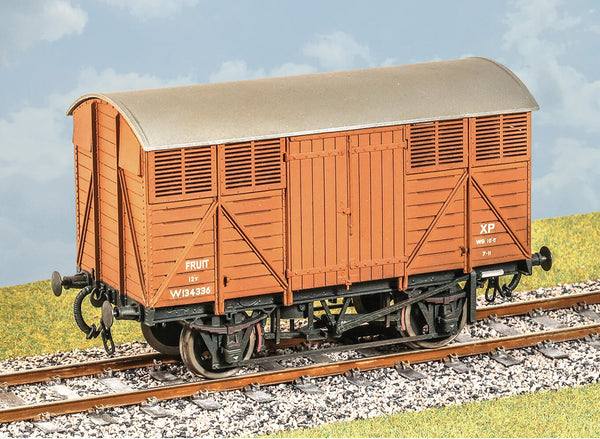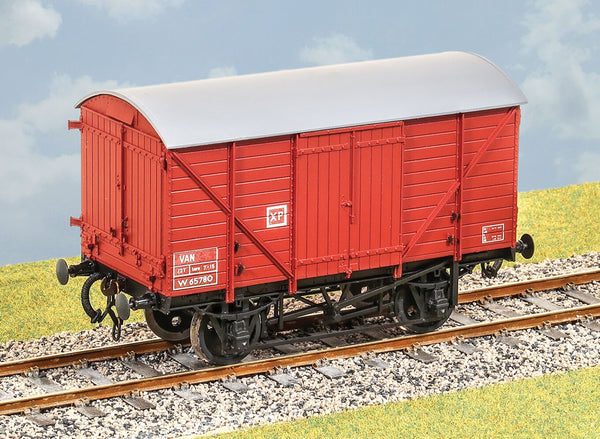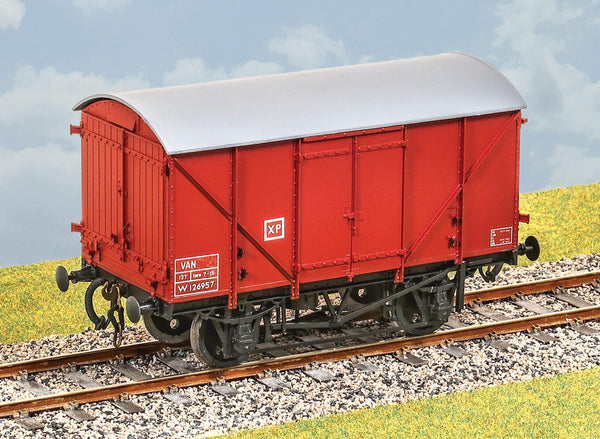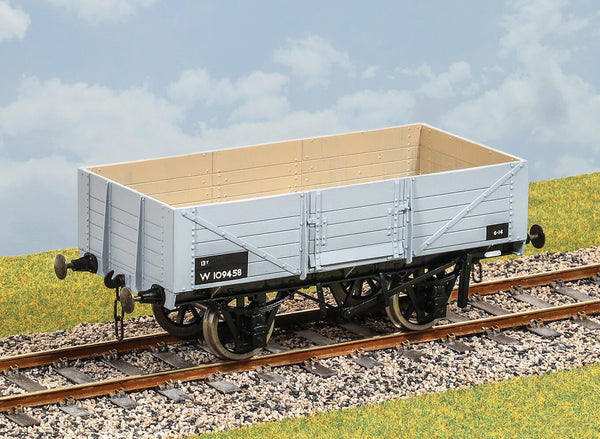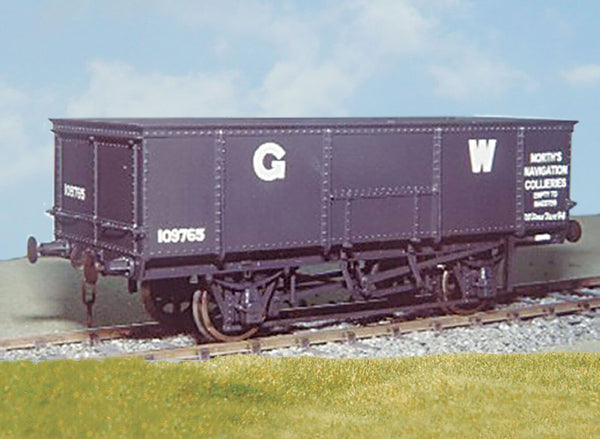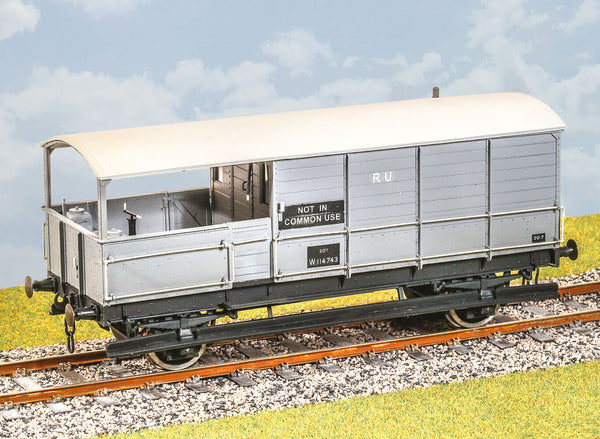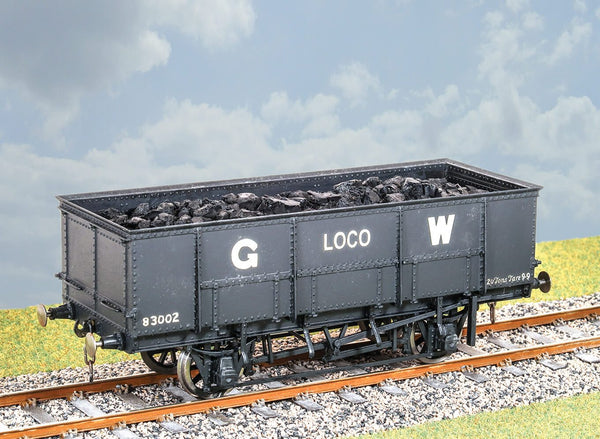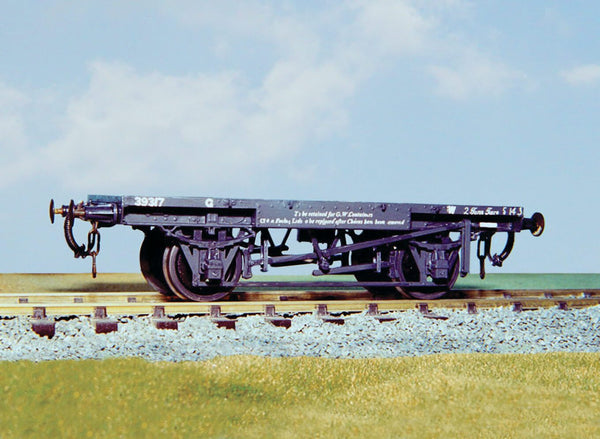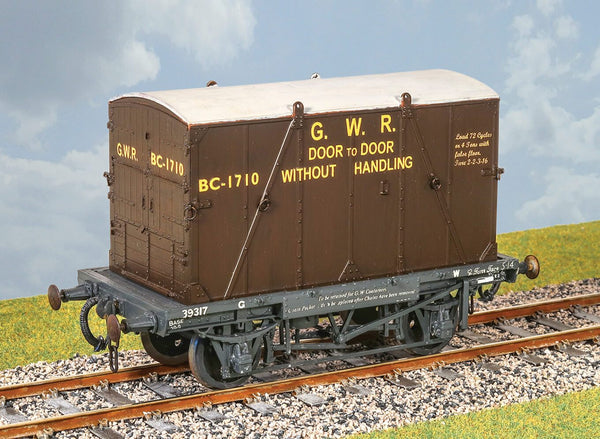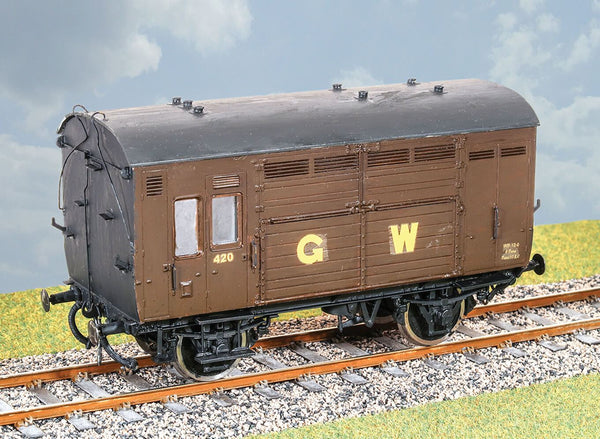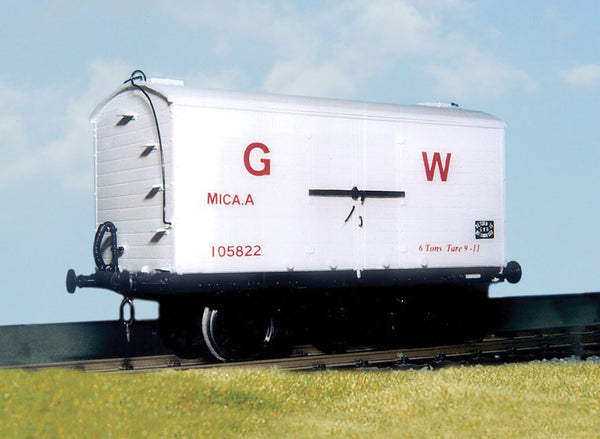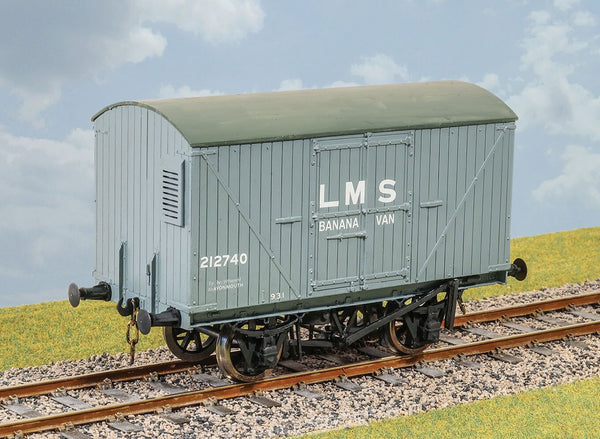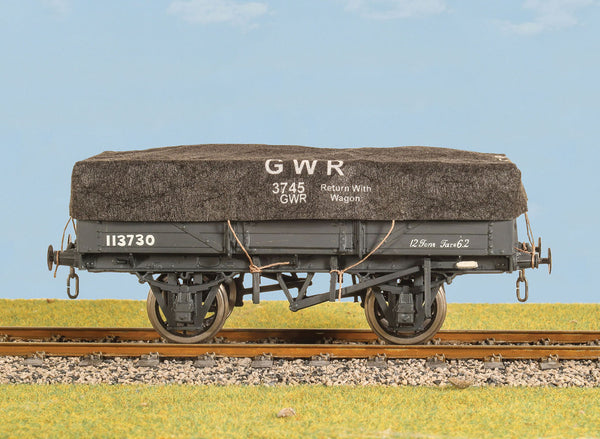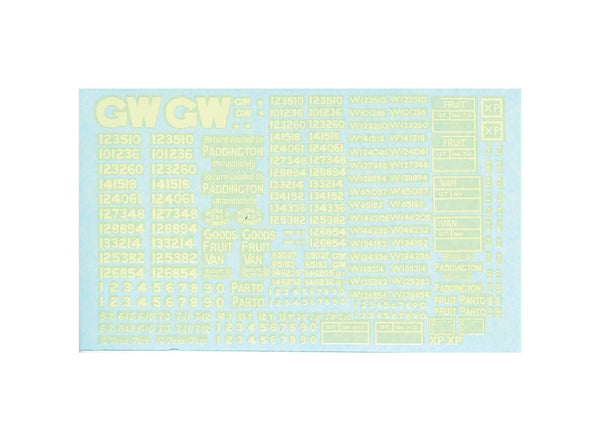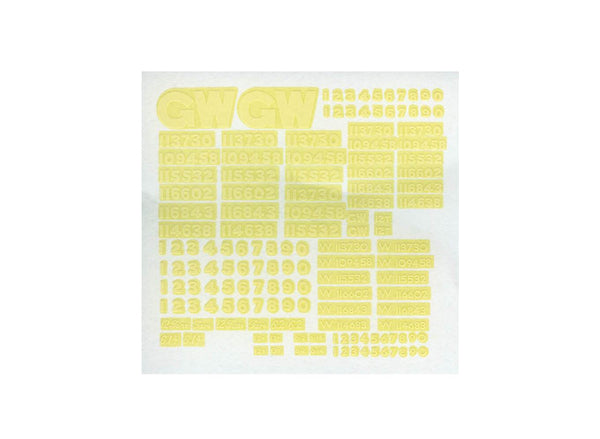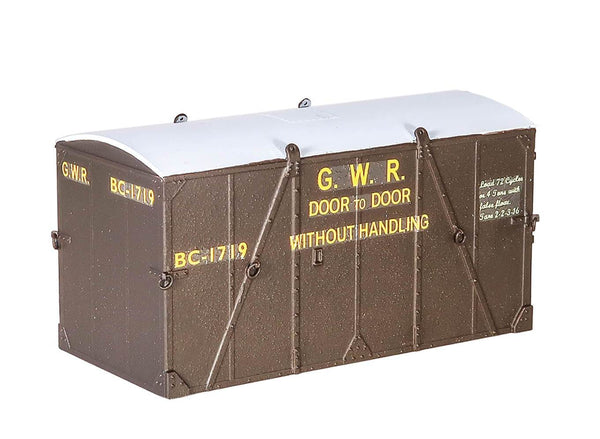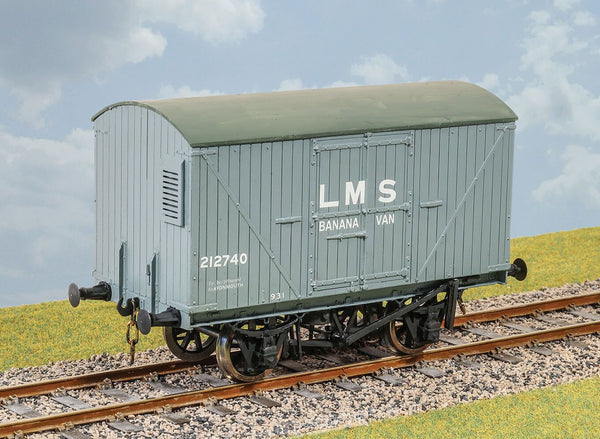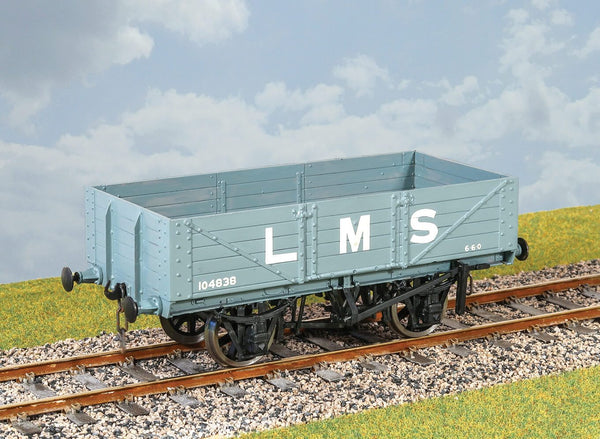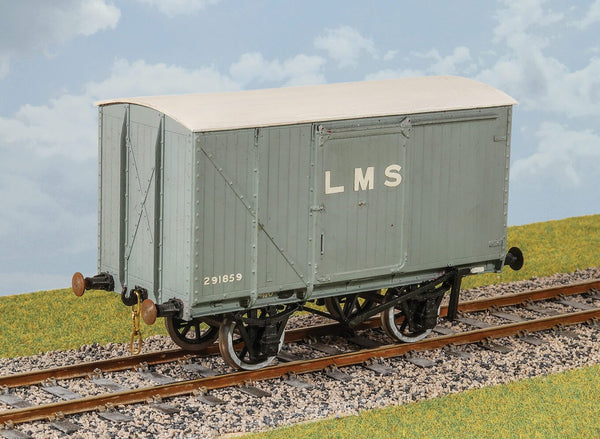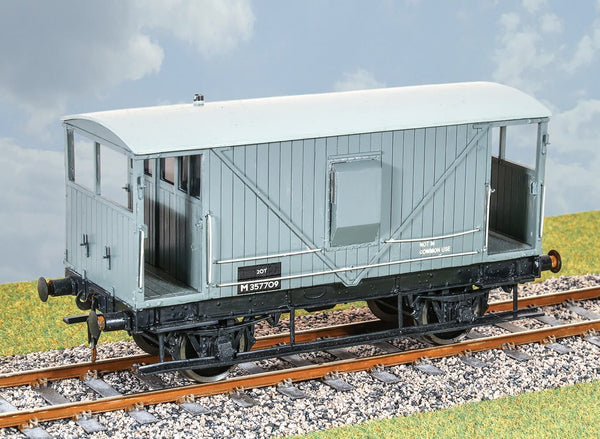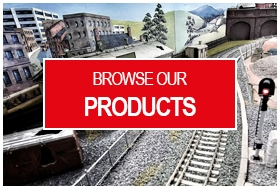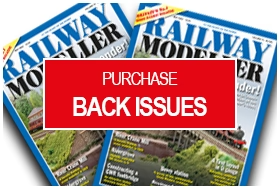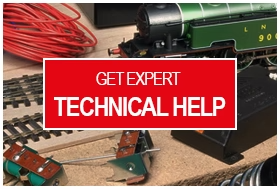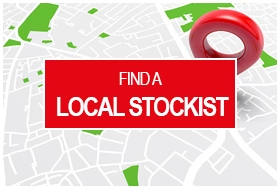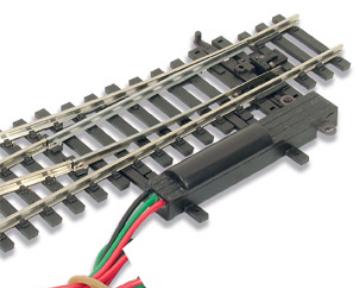BROWSE PECO PRODUCTS
Browse through our complete product portfolio.
104 Products Found
16 Ton Mineral Wagon Transfers (Waterslide)
Transfers (Waterslide) GWR/BR from Kits PS30-32)
3 Link Couplings Etched hook Springs
Kit and Scratch builder's accessory. Pack contains 2 pairs of couplings. Three-link chain couplings, with no means of drawing the wagons together, were used to form the peculiarly British "loose coupled" freight train: since such trains were not fitted with an automatic through-train braking system there were no pipes to connect between the vehicles. Control of the train was assisted by the guard's van at the rear of the train, or in certain cases a series of vans spaced along the train, which kept the couplings taut and therefore also helped prevent snapped couplings. Such trains travelled at low speeds and were finally phased out in the 1970s.
3 Link Instanter Couplings, Hooks, Springs
Kit and Scratch builder's accessory. Pack contains sufficient parts for 2 pairs of Couplings. The "Instanter" coupling is a development of the standard 3 link coupling. The middle link of the chain is specially shaped so that when lying flat it provides enough slack to make coupling possible, but when this middle link is rotated 90 degrees the length of the chain is effectively shortened, reducing the amount of slack to provide closer coupling, to allow the use of train brake pipes without the need to wind a screw. It can also be coupled from the side of the wagons using a shunter's pole; much safer than having to go between vehicles when coupling them together.
B' Container Transfers (Pressfix) GWR/BR
Transfers (Pressfix) GWR/BR 'B' Container (from kit PS39)
Banana and Meat Van Transfers (Waterslide)
Transfers (Waterslide) SR/BR (from kits PS100-101)
Black Background Transfers (Waterslide)
Transfers (Waterslide) Black Background Patches (Pack of 5)
BR 12 ton Pipe Wagon Transfers.
BR 12 ton Pipe Wagon Transfers: 1950s and 1960s/70s periods (from Kit PS17)
BR 12ton Insulated Fish Van
This is a well-known vehicle, derived from the final LNER Fish van design. BR built 1,000 of them. After fish traffic ended they were converted to Parcels Vans (SPV) and lasted into the 1980s. The kit allows both oil and roller bearing axle box versions to be built. Transfers for BR. These finely moulded plastic wagon kits come complete with pin point axle wheels and bearings, 3 link couplings and transfers. This kit is supplied with pre-coloured moulded parts although painting can improve the appearance. Additional parts to enable the vehicle to be modelled incorporating modifications made to the prototypes during their working life are included where appropriate.
BR 12ton Pipe Wagon
These wagons were designed to carry heavy cast iron or steel pipes for water and drainage works. This kit represents one of 350 built in 1955. Withdrawn between late 70s and early 80s. Transfers for early and post-TOPS BR. These finely moulded plastic wagon kits come complete with pin point axle wheels and bearings, 3 link couplings and transfers. This kit is supplied with pre-coloured moulded parts although painting can improve the appearance. Additional parts to enable the vehicle to be modelled incorporating modifications made to the prototypes during their working life are included where appropriate.
BR 16ton Mineral Wagon
6,000 were built at the end of the Second World War for service in France. They returned to the UK later in the 1950s and remained in use into the 1960s. Many were then sold into private industry use. Transfers for BR. These finely moulded plastic wagon kits come complete with pin point axle wheels and bearings, 3 link couplings and transfers. This kit is supplied with pre-coloured moulded parts although painting can improve the appearance. Additional parts to enable the vehicle to be modelled incorporating modifications made to the prototypes during their working life are included where appropriate.
BR 16ton Mineral Wagon
The definitive BR standard mineral wagon produced in vast quantities during the 1950s, and used well in to the 1980s, carrying coal, scrap metal and many different minerals. Parts included for Instanter couplings and double brake gear. Transfers for early, late and post-TOPS BR. These finely moulded plastic wagon kits come complete with pin point axle wheels and bearings, 3 link couplings and transfers. This kit is supplied with pre-coloured moulded parts although painting can improve the appearance. Additional parts to enable the vehicle to be modelled incorporating modifications made to the prototypes during their working life are included where appropriate.
BR 16ton Mineral Wagon
The sloped sided design evolved from pre-1939 private owner wagons built by Chas. Roberts and Co. After the liberation of France 2,500 were shipped over there, 1,900 later returning. Around 10,000 were in stock with BR, with withdrawal taking place in the 1960s. Some ended up private industry use. Transfers for BR. These finely moulded plastic wagon kits come complete with pin point axle wheels and bearings, 3 link couplings and transfers. This kit is supplied with pre-coloured moulded parts although painting can improve the appearance. Additional parts to enable the vehicle to be modelled incorporating modifications made to the prototypes during their working life are included where appropriate.
BR 18ton Sand Wagon
A fleet of specialist wagons for industrial and building sand were constructed in the early 1950s. They were designed for emptying by tipper or grab. Withdrawal started in the 1970s, some lasting in Civil Engineers service into the 1980s. Transfers for early and post-TOPS BR. These finely moulded plastic wagon kits come complete with pin point axle wheels and bearings, 3 link couplings and transfers. This kit is supplied with pre-coloured moulded parts although painting can improve the appearance. Additional parts to enable the vehicle to be modelled incorporating modifications made to the prototypes during their working life are included where appropriate.
BR 21ton Coal Hopper Wagon
16,800 of these wagons were constructed in the 1950s. They were widely used throughout the North East for the transport of coal. Roller bearing axle boxes were applied to some in the 1960s, options for which are in the kit, and lasted until the 1980s. Transfers for early, late and post-TOPS BR. These finely moulded plastic wagon kits come complete with pin point axle wheels and bearings, 3 link couplings and transfers. This kit is supplied with pre-coloured moulded parts although painting can improve the appearance. Additional parts to enable the vehicle to be modelled incorporating modifications made to the prototypes during their working life are included where appropriate.
BR 21ton Mineral Wagon
1,500 examples built 1950 – 1951, mainly for the transport of coal. Widely used and lasted until the 1980s. Transfers for early and post-TOPS BR. These finely moulded plastic wagon kits come complete with pin point axle wheels and bearings, 3 link couplings and transfers. This kit is supplied with pre-coloured moulded parts although painting can improve the appearance. Additional parts to enable the vehicle to be modelled incorporating modifications made to the prototypes during their working life are included where appropriate.
BR 21ton Trestle Wagon
This design of wagon allowed over-sized steel plates to be carried on a trestle mounted on the wagon. These wagons remained in service into the 1970s. Kit includes securing chains and shackles. Transfers for BR 1950s – 1970s. These finely moulded plastic wagon kits come complete with pin point axle wheels and bearings, 3 link couplings and transfers. This kit is supplied with pre-coloured moulded parts although painting can improve the appearance. Additional parts to enable the vehicle to be modelled incorporating modifications made to the prototypes during their working life are included where appropriate.
BR 24.5ton Mineral Wagon
2,150 of this design were built in 1953 – 1956. Used to carry coal for steel works, power stations and engines sheds. Were intended as the standard mineral wagon, but were too large for many customers. Withdrawn by 1982. Transfers for BR 1950s – 1970s. These finely moulded plastic wagon kits come complete with pin point axle wheels and bearings, 3 link couplings and transfers. This kit is supplied with pre-coloured moulded parts although painting can improve the appearance. Additional parts to enable the vehicle to be modelled incorporating modifications made to the prototypes during their working life are included where appropriate.
BR Grampus Ballast Wagon
Over 4,000 built from 1951 to 1959, with some in service into the 21st century. Used for carrying ballast and engineer’s materials. Featured fold-down sides for ease of access. Includes etched brass BR region plaques and transfers for early and post-TOPS BR. These finely moulded plastic wagon kits come complete with pin point axle wheels and bearings, 3 link couplings and transfers. This kit is supplied with pre-coloured moulded parts although painting can improve the appearance. Additional parts to enable the vehicle to be modelled incorporating modifications made to the prototypes during their working life are included where appropriate.
BR Wagon Tarpaulin
O Scale BR wagon tarpaulin, produced from a material that convincingly replicates the texture and look of canvas tarpaulins once commonly used on open wagons, to protect the contents underneath. Each product contains 3 tarpaulins.
Buffers NBR (White Metal)
Kit and Scratch builder's accessory. Pack contains sufficient parts for 4 Buffers
Buffers RCH (White Metal)
Kit and Scratch builder's accessory. Pack contains sufficient parts for 4 Buffers
Buffers RCH End Door
Kit and Scratch builder's accessory. Pack contains sufficient parts for 4 Buffers
Coal Loads for 16ton Mineral Wagon
Pack of 3 0 Gauge coal loads suitable for Parkside PS30/31 and 32; also Peco W-607 Wagon kits.
GWR 12/13ton Open Goods Wagon
Dia. O32: over 10,000 unfitted built (1933 – 1940); O33: 948 built with vacuum brake and tarpaulin rails. Most lasted into the 1970s, with some featuring fabricated steel strengthening. The kit covers all variants. Transfers for GWR and BR. These finely moulded plastic wagon kits come complete with pin point axle wheels and bearings, 3 link couplings and transfers. This kit is supplied with pre-coloured moulded parts although painting can improve the appearance. Additional parts to enable the vehicle to be modelled incorporating modifications made to the prototypes during their working life are included where appropriate.
GWR 12ton Covered Goods Wagon
Plywood body construction came about as a result of a shortage of wooden planks at the end of the last war. A total of 1,100 vans were built, 350 with only a hand brake (diagram V37), which eventually had vacuum brakes retro-fitted. They lasted into the 1970s. Transfers for GWR and BR.These finely moulded plastic wagon kits come complete with pin point axle wheels and bearings, 3 link couplings and transfers. This kit is supplied with pre-coloured moulded parts although painting can improve the appearance. Additional parts to enable the vehicle to be modelled incorporating modifications made to the prototypes during their working life are included where appropriate.
GWR 12ton Covered Goods Wagon
Dia. V24: hand brake only (1933 – 1943); V23: vacuum brakes (1933 - 1941); V26, known as ‘PARTO’ was as a V23 with internal partitions (1935 – 1939). Many lasted into the 1970s. Transfers for GWR and BR. These finely moulded plastic wagon kits come complete with pin point axle wheels and bearings, 3 link couplings and transfers. This kit is supplied with pre-coloured moulded parts although painting can improve the appearance. Additional parts to enable the vehicle to be modelled incorporating modifications made to the prototypes during their working life are included where appropriate.
GWR 12ton Covered Goods Wagon
950 wagons of this design were built between 1929 and 1933. Withdrawal took place in the early 1960s. These wagons were regarded as ‘common user’ so would have been found across the whole network. Transfers for GWR and BR. These finely moulded plastic wagon kits come complete with pin point axle wheels and bearings, 3 link couplings and transfers. This kit is supplied with pre-coloured moulded parts although painting can improve the appearance. Additional parts to enable the vehicle to be modelled incorporating modifications made to the prototypes during their working life are included where appropriate.
GWR 12ton Fruit Van
200 of these vans were built 1937/38 to convey Guernsey tomatoes. They were also used for other fruit and vegetable traffic. The fleet lasted into the 1970s, being used for general merchandise outside of the season. Transfers for GWR and BR. These finely moulded plastic wagon kits come complete with pin point axle wheels and bearings, 3 link couplings and transfers. This kit is supplied with pre-coloured moulded parts although painting can improve the appearance. Additional parts to enable the vehicle to be modelled incorporating modifications made to the prototypes during their working life are included where appropriate.
GWR 12ton Motor Car Van
350 of these were built between 1933 and 1936. Their telegraphic code was MOGO. The main traffic was from Morris Cowley, but might also have been used for general merchandise. All were withdrawn in the 1960s. Transfers for GWR and BR. These finely moulded plastic wagon kits come complete with pin point axle wheels and bearings, 3 link couplings and transfers. This kit is supplied with pre-coloured moulded parts although painting can improve the appearance. Additional parts to enable the vehicle to be modelled incorporating modifications made to the prototypes during their working life are included where appropriate.
GWR 12ton Motor Car Van
Similar to diagram G31, these wagons were built in 1946 and 1947, but with a plywood body. They lasted into the 1960s. Transfers for GWR and BR. These finely moulded plastic wagon kits come complete with pin point axle wheels and bearings, 3 link couplings and transfers. This kit is supplied with pre-coloured moulded parts although painting can improve the appearance. Additional parts to enable the vehicle to be modelled incorporating modifications made to the prototypes during their working life are included where appropriate.
GWR 13ton Open Goods Wagon
Almost 2,000 of these wagons were built between 1924 and 1929. The design was one of the first produced by the GWR using Railway Clearing House spec brake gear. Many survived into 1960s. These finely moulded plastic wagon kits come complete with pin point axle wheels and bearings, 3 link couplings and transfers. This kit is supplied with pre-coloured moulded parts although painting can improve the appearance. Additional parts to enable the vehicle to be modelled incorporating modifications made to the prototypes during their working life are included where appropriate.
GWR 20ton Felix Pole Coal Wagon
Almost 1,000 of these high capacity wagons were built in the 1920s for Welsh coal traffic. Rerated to a 21-ton capacity wagon during the Second World War, they were in traffic until the 1960s. Transfers for GWR and BR, and for Norths Navigation Collieries. These finely moulded plastic wagon kits come complete with pin point axle wheels and bearings, 3 link couplings and transfers. This kit is supplied with pre-coloured moulded parts although painting can improve the appearance. Additional parts to enable the vehicle to be modelled incorporating modifications made to the prototypes during their working life are included where appropriate.
GWR 20ton Goods Brake Van
221 of these vans were built between 1927 and 1931. Seen all over the GWR, and later BR Western Region. Examples lasted until the 1960s. Transfers for GWR and BR. These finely moulded plastic wagon kits come complete with pin point axle wheels and bearings, 3 link couplings and transfers. This kit is supplied with pre-coloured moulded parts although painting can improve the appearance. Additional parts to enable the vehicle to be modelled incorporating modifications made to the prototypes during their working life are included where appropriate.
GWR 20ton Loco Coal Wagon
Converted from the “Felix Pole” wagons (PS41), 200 were so treated in 1934-35, to convey coal to GWR locomotive sheds. Featuring extra side doors, they joined the general coal fleet in the 1950s. Transfers for GWR and BR. These finely moulded plastic wagon kits come complete with pin point axle wheels and bearings, 3 link couplings and transfers. This kit is supplied with pre-coloured moulded parts although painting can improve the appearance. Additional parts to enable the vehicle to be modelled incorporating modifications made to the prototypes during their working life are included where appropriate.
GWR Container Wagon
Standard GWR container (CONFLAT) wagon, as used in kit PS39, but without the container. Transfers for GWR and BR. These finely moulded plastic wagon kits come complete with pin point axle wheels and bearings, 3 link couplings and transfers. This kit is supplied with pre-coloured moulded parts although painting can improve the appearance. Additional parts to enable the vehicle to be modelled incorporating modifications made to the prototypes during their working life are included where appropriate.
GWR Container Wagon with 'B' Cont.
This was the standard GWR container wagon (CONFLAT) from 1933 to 1939. Examples lasted into the 1970s. The container supplied with this kit was of a type used to convey bicycles, and is also available separately (PS74). Wagon and container transfers for GWR and BR. These finely moulded plastic wagon kits come complete with pin point axle wheels and bearings, 3 link couplings and transfers. This kit is supplied with pre-coloured moulded parts although painting can improve the appearance.. Additional parts to enable the vehicle to be modelled incorporating modifications made to the prototypes during their working life are included where appropriate.
GWR Horse Box Wagon
300 of these vehicles were built in the 1920s, lasting into the 1950s and 60s. They were used to carry horses to racecourses and stables, often marshalled into passenger and parcels trains. Transfers for GWR and BR. These finely moulded plastic wagon kits come complete with pin point axle wheels and bearings, 3 link couplings and transfers. This kit is supplied with pre-coloured moulded parts although painting can improve the appearance. Additional parts to enable the vehicle to be modelled incorporating modifications made to the prototypes during their working life are included where appropriate.
GWR Mica Insulated Van
In 1929, 54 of these vans were built to carry meat in chilled conditions. The hoppers inside were filled with “Drikeld” solid carbon dioxide through characteristic roof vents. They lasted into the 1960s, some being converted into “TEVAN” vans (PS48). Transfers for GWR and BR. These finely moulded plastic wagon kits come complete with pin point axle wheels and bearings, 3 link couplings and transfers. This kit is supplied with pre-coloured moulded parts although painting can improve the appearance. Additional parts to enable the vehicle to be modelled incorporating modifications made to the prototypes during their working life are included where appropriate.
GWR Tevan Goods Van
These vans were converted from Mica Insulated Vans in 1938 (see PS49). They carried tea and coffee from the Lyons depot at Greenford into the 1960s. They featured a zinc-lined body. Transfers for GWR and BR. These finely moulded plastic wagon kits come complete with pin point axle wheels and bearings, 3 link couplings and transfers. This kit is supplied with pre-coloured moulded parts although painting can improve the appearance. Additional parts to enable the vehicle to be modelled incorporating modifications made to the prototypes during their working life are included where appropriate.
GWR Wagon Tarpaulin
O Scale GWR wagon tarpaulin, produced from a material that convincingly replicates the texture and look of canvas tarpaulins once commonly used on open wagons, to protect the contents underneath. Each product contains 3 tarpaulins.
GWR/BR Box and Fruit Van Transfers (Waterslide)
Transfers (Waterslide) GWR/BR (from Kits PS26-29)
GWR/BR Open and Box VanTransfers (Waterslide)
Transfers (Waterslide) GWR/BR (from Kits PS23-24)
GWR/BR ‘B’ Container
Period Transfers included. A Conflat, road vehicle load, or as a scenic accessory for the Goods Yard.
LMS 10ton Banana Van
1,000 of these vans were built between 1925 and 1930 to carry ripening bananas from ports to inland warehouses. They were steam heated by means of through pipes from the locomotive. The steam heating equipment was later removed, but the vans lasted into the 1960s. Transfers for LMS and BR. These finely moulded plastic wagon kits come complete with pin point axle wheels and bearings, 3 link couplings and transfers. This kit is supplied with pre-coloured moulded parts although painting can improve the appearance. Additional parts to enable the vehicle to be modelled incorporating modifications made to the prototypes during their working life are included where appropriate.
LMS 12ton Open Goods Wagon
8,500 of this type were built in the 1920s for carrying general goods traffic. It is a Midland Railway-derived design with a steel chassis. As they were classified “common user” they would turn up anywhere on the railway network. Transfers for LMS and BR. These finely moulded plastic wagon kits come complete with pin point axle wheels and bearings, 3 link couplings and transfers. This kit is supplied with pre-coloured moulded parts although painting can improve the appearance. Additional parts to enable the vehicle to be modelled incorporating modifications made to the prototypes during their working life are included where appropriate.
LMS 12ton Van
Built by the LMS, who produced over 2,500 in 1924 – 1926. Midland Railway design with 9-foot steel chassis. Lasted until the early 1960s. Transfers for LMS and BR. These finely moulded plastic wagon kits come complete with pin point axle wheels and bearings, 3 link couplings and transfers. This kit is supplied with pre-coloured moulded parts although painting can improve the appearance. Additional parts to enable the vehicle to be modelled incorporating modifications made to the prototypes during their working life are included where appropriate.
LMS 20ton Goods Brake Van
Developed from a Midland Railway design, 950 of these vans were built between 1927 and 1931. After Nationalisation their use spread to other areas of BR, especially the Eastern Region. A few lasted into the 1990s. Transfers for LMS and BR. These finely moulded plastic wagon kits come complete with pin point axle wheels and bearings, 3 link couplings and transfers. This kit is supplied with pre-coloured moulded parts although painting can improve the appearance. Additional parts to enable the vehicle to be modelled incorporating modifications made to the prototypes during their working life are included where appropriate.
